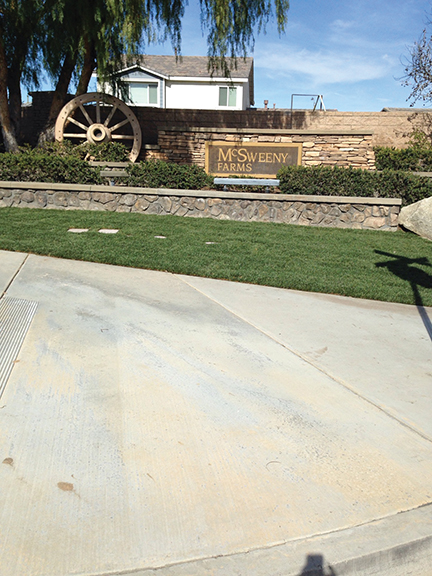The Valley Chronicle - McSweeny Farms gets new fundingng
McSweeny Farms gets new funding
·
2 min read
Council approves new acquisition agreement for phases 2 and 3 of project
[caption id="attachment_17061" align="alignright" width="432"] Tom Jones/The Valley Chronicle
Tom Jones/The Valley ChronicleEntrance to phase one of the 673-acre project.[/caption] ■ By Tom Jones / Contributed The Hemet City Council unanimously approved a resolution for revised construction funding and an acquisition agreement for McSweeny Farms. This resolution is in regards to infrastructure construction and acquisition for phases two and three of the 673-acre development off of State Street in southwest Hemet. The original plan called for construction of 1,640 single family homes, three neighborhood parks, a clubhouse and pool facility, an elementary school, a 12-acre commercial site and 100 acres of open space. The open space will include a connecting system of bike paths, equestrian trails and pedestrian walkways, as well as roads, water and sewer systems and storm drains. The proposed project was planned to be constructed in three phases with the original developer, Sun Cal, installing the bulk of the infrastructure for phase one. Sun Cal built all of the 310 homes for that phase before going into bankruptcy in 2008 with the recession of that year. The balance of the project was purchased by Raintree Investment Corp. who became the master developer. Before the remaining homes can be constructed, however, the remaining infrastructure had to be in place. In 2016, Raintree requested and was granted approval of the creation of a Community Facilities District (CDF) to fund the master planned infrastructure. Administered by the California Statewide Communities Development Authority, the CDF is a bonding authority to raise funds and pay for such improvements through assessments on the properties in the district. State authority rules require developers to fund improvements and then seek reimbursement. If built by the city, however, the CDF pays the city for construction as improvements are built. The bonds are issued as limited obligation bonds secured by the special taxes and underlying property subject to the lien. Therefore, because homes in phase one are already built and occupied the residents of the original homes are not subject to the CDF assessments even though they will enjoy some of the benefits of common improvements.
S
